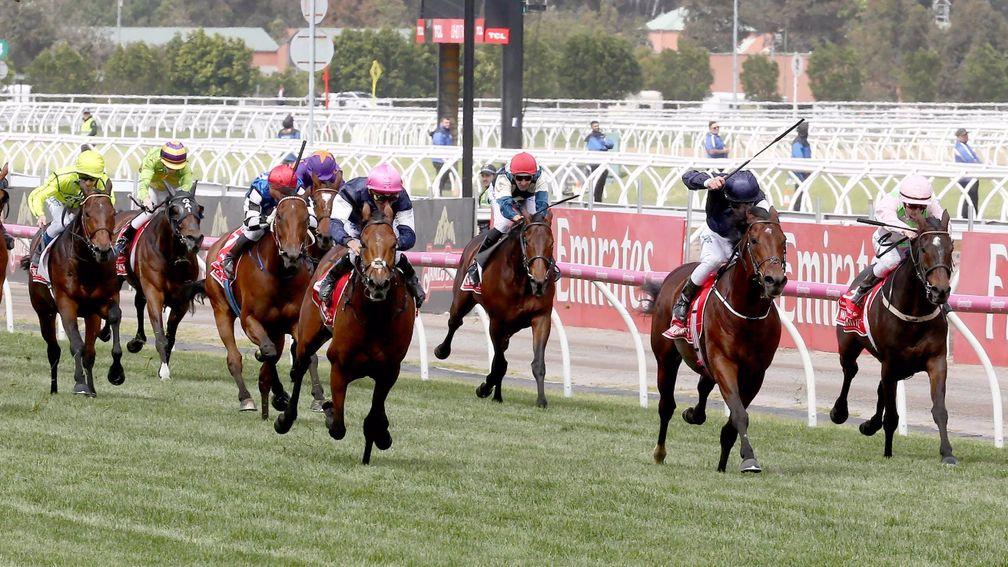Phenomenal O'Brien triumph another reality check for locals

The Irish were celebrating, the British were left lamenting (yet again) and most Australians – bar prominent owner Lloyd Williams – were left wondering what the hell was going on after Tuesday's Melbourne Cup.
You all know the bare facts by now. Joseph O’Brien trained the winner Rekindling, upstaging his father Aidan with runner-up Johannes Vermeer – both raced by Williams and partners, and Williams now boasts six Cup winners as an owner.
It was a third win for the Irish following Dermot Weld’s successes with Vintage Crop and Media Puzzle. The ‘rot’ started with Vintage Crop in 1993 and was well and truly evident today with Willie Mullins’ Max Dynamite completing an Irish trifecta in 'Australia’s race'.
That the first three home were northern hemisphere-trained should have surprised nobody. The score in top three placings is now 16-14 in their favour over the locals in the past ten years, and that’s from fewer runners.

The number of visitors is, however, increasing year by year and is unlikely to decline even if British trainers might be getting a touch gun shy. Their record is now 0-64 (and that’s excluding Godolphin runners) but the quest endures and Ed Dunlop (three times) and Luca Cumani (twice) have both nearly pulled it off.
There were no fewer than 11 northern hemisphere-trained runners this year and they filled eight of the first ten places. There have now been six winners, since Weld blazed the trail in the race which Victoria Racing Club chairman Amanda Elliott described, somewhat ironically, as a "rich mark of our national heritage".
I’m not so sure that’s still the case. By definition, the plethora of overseas runners means locally trained horses can miss out. That’s obviously an issue for local owners and trainers and, indeed, for most casual punters who could be forgiven for asking, ‘Who are these horses?’
Changes afoot
There are changes afoot for next year’s Melbourne Cup. “There will be a prize-money increase,” Elliott said, “a new race sponsor and new grandstand. We'll also be working with our partner Tabcorp on the question of enabling emergency runners.”
Provision for emergency runners is one of several key issues, but another may well be whether there are too many overseas trained runners.
The first question is whether too much emphasis is given to European form which is denying local horses a start courtesy of the handicapping. Do we need 11 overseas-trained runners?
The primary example is the in-form Vengeur Masque missing out for the second year running.
His trainer Mike Moroney, who won the Melbourne Cup in 2000 with Brew, is understandably annoyed if measured in his response. “I’m not one for complaining but it does seem too much credence is given to overseas form," he said.
“Our horse had 50.5 [kilograms] in last year’s Caulfield Cup and ran an eyecatching eighth. He’s since run second in a Group 3, the Queen Elizabeth, and second in the Listed Mornington Cup and yet was given only 50 [kilograms] in this year’s Cup. I think a horse from Europe with that form would have been given more weight."
Post handicap release, Vengeur Masque won the Geelong Cup, as did recent Melbourne Cup winners Dunaden and Americain.
“I was then surprised he was given only a half kilogram penalty," said Moroney. "There were European horses above him in the weights and therefore in the field who are not stakes winners."
They were Thomas Hobson, Wall Of Fire and Nakeeta.
Dispelling the myths
Many a Melbourne Cup myth went out the window when Vintage Crop won in 1993. Another was dispelled here with Rekindling winning after 97 horses, post Vintage Crop, had tried and failed to win the Cup on their first run on Australian soil.
The result speaks again to the superiority of the European-bred stayer, but there can be no encouragement for locals if a start in the Cup becomes ever harder to secure.
I make no judgement as to whether ‘internationalisation’ of the Cup is necessarily good or bad, but it may just have spiralled out of control.
It is, at least, a matter worth considering in the annual Melbourne Cup review.
Published on inMelbourne Cup
Last updated
- The Melbourne Cup Carnival ends with remarkable numbers that might make some in Britain and Ireland gulp
- Via Sistina dazzles again as former British star continues her sensational spring with Flemington romp
- Flemington: Yulong gets ready for Via Sistina's Saturday star turn with a Classic triumph
- Punter nets whopping A$3.2 million from $100 Melbourne Cup bet
- Ronan Keating lands a chunky punt as fellow Irish singer rides to Melbourne Cup glory
- The Melbourne Cup Carnival ends with remarkable numbers that might make some in Britain and Ireland gulp
- Via Sistina dazzles again as former British star continues her sensational spring with Flemington romp
- Flemington: Yulong gets ready for Via Sistina's Saturday star turn with a Classic triumph
- Punter nets whopping A$3.2 million from $100 Melbourne Cup bet
- Ronan Keating lands a chunky punt as fellow Irish singer rides to Melbourne Cup glory